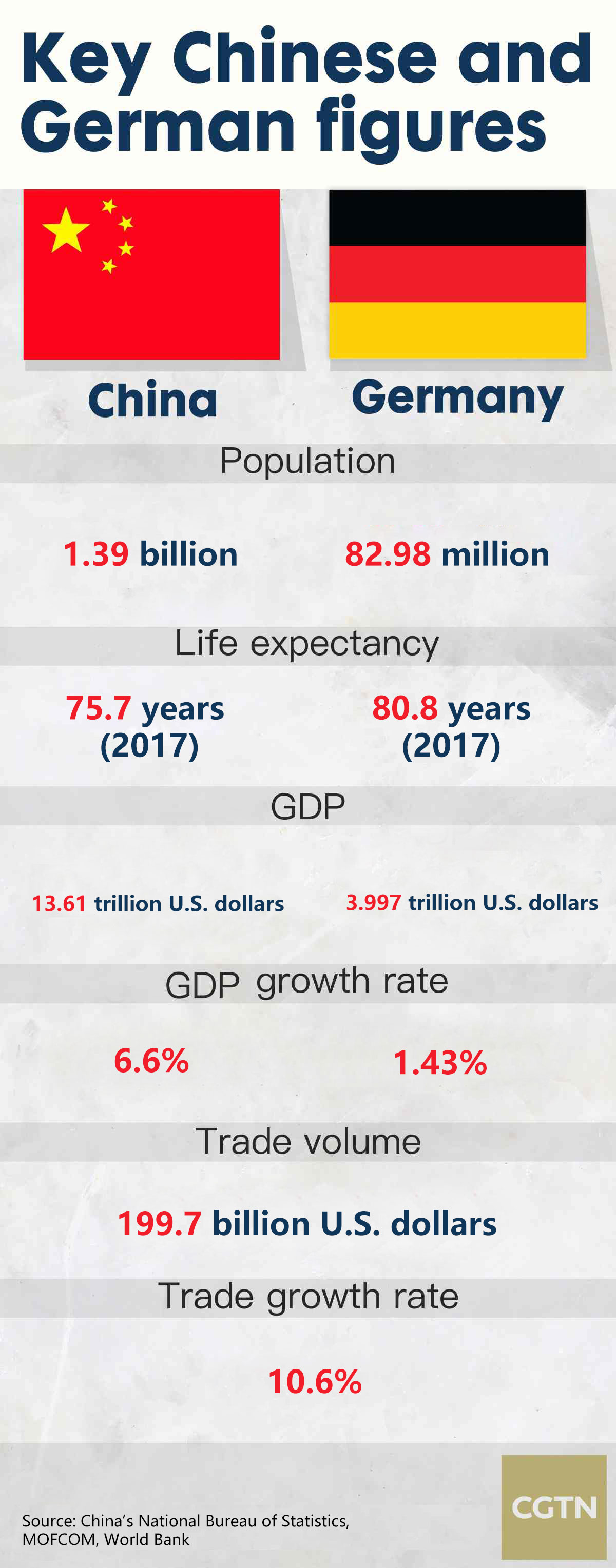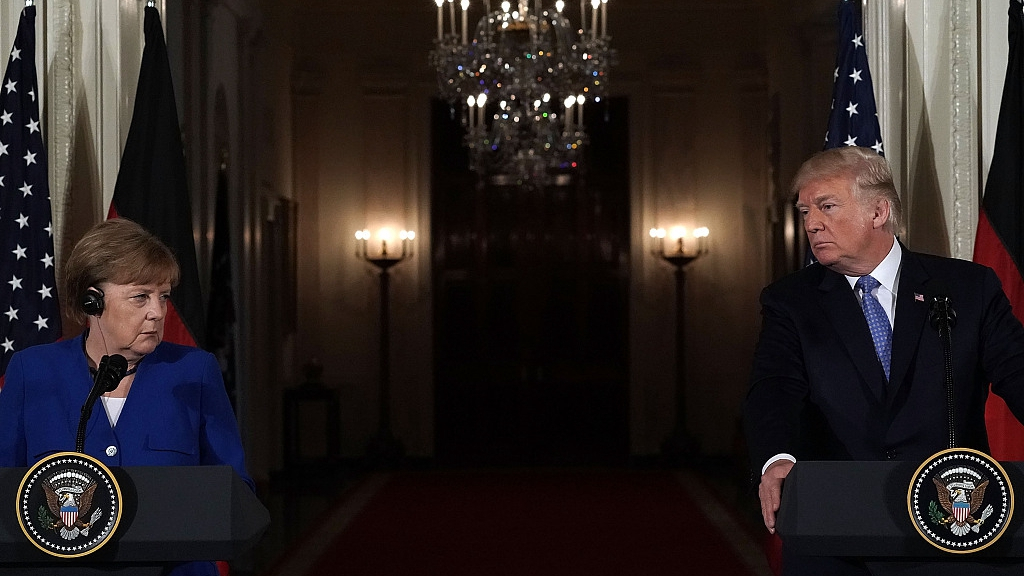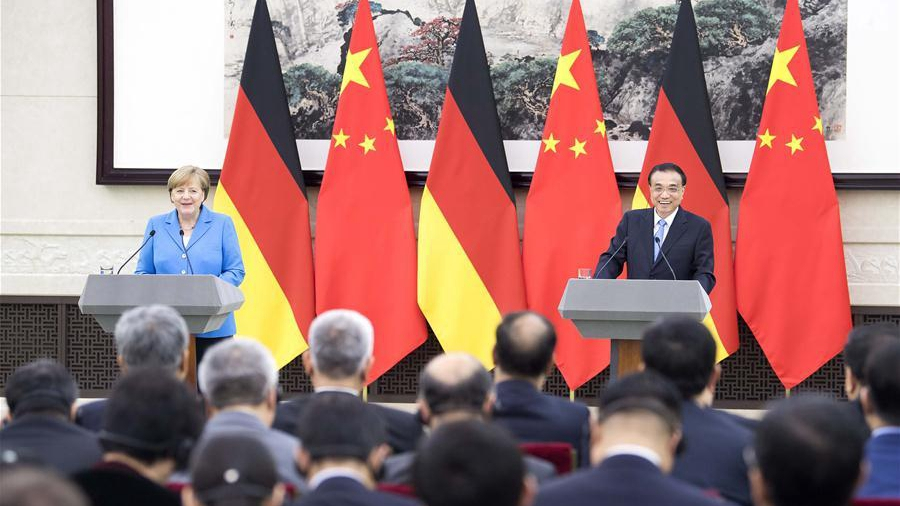
German Chancellor Angela Merkel will pay an official visit to China on Friday and Saturday at the invitation of Chinese Premier Li Keqiang amid growing divisions between the United States and the EU over trade and the Iran nuclear deal.
The visit comes after Merkel and other European leaders, who've been calling for multilateralism, struggle to save a flagging EU-U.S. trade deal and tamp down confrontation between Washington and Tehran.
The G7 summit in Biarritz two weeks ago exposed marked differences between the United States and other G7 countries. Given their dispute, analysts believe that economic matters would be top priority during Merkel's visit to China, and facing America's unilateralism, Berlin and Beijing are expected to make progress on trade and investment.
Partners not rivals
China-Germany relations have maintained sound momentum since diplomatic ties were established in 1972. The relationship goes beyond the bilateral scope, with the two nations sharing common ground on many issues.

China has been Germany's largest trading partner for three consecutive years, with the trade volume reaching 199.66 billion U.S. dollars in 2018. Likewise, Germany is China's biggest trading partner in Europe.
When Chinese President Xi Jinping met with Merkel on the sidelines of the 13th G20 summit in Buenos Aires last year, the two leaders agreed to safeguard free trade and oppose protectionism.
Merkel reiterated her position on multilateralism at the 55th Munich Security Conference earlier this year by saying that "multilateralism may be complicated, but it's better than staying at home alone." She said she was "shocked" to learn that the U.S. views German auto exports as a national threat.
China and Germany have also agreed to explore third-party market cooperation and conducted deep cooperation in fields such as artificial intelligence, new materials, new energy and smart cities.
China also sees Germany as an important partner in the Belt and Road Initiative (BRI). The port of Duisburg is a pilot project under the BRI framework. It has become the world's largest inland port, connecting China and Europe thanks to the development of a rail network that promotes trade.

A model of a train station at the main train station of Duisburg, Germany. The city is rediscovering itself as the world's largest inland port, thanks in part to growing rail trade with China. /CGTN Photo
Regarding Europe as an important power in promoting multilateralism, China hopes its relations with Germany would inject more stability to develop China-Europe cooperation and "set a model for global cooperation," as Xi pointed out during his meeting with Merkel in Buenos Aires.
China and Germany also share similar stances on the Iran nuclear issue by opposing the so-called "maximum pressure" policy and calling for dialogue.
"Germany follows the Iran nuclear deal. We have carried out a lot of diplomatic efforts to establish the deal," said Merkel when meeting Trump at the G7 summit. "Although the agreement is not perfect, but there is no replacement. Other choices will make the region even more unstable," she added.
Chinese State Councilor and Foreign Minister Wang Yi made similar remarks when meeting with his Iranian counterpart Mohammad Javad Zarif in late August, calling for political solutions to the Iran nuclear issue while appreciating Iran's compliance with the pact.

U.S. President Donald Trump (R) and German Chancellor Angela Merkel participate in a joint news conference at the East Room of the White House in Washington, DC, April 27, 2018. /VCG Photo
What is likely to be achieved?
This is Merkel's 12th trip to China since taking office.
Cui Hongjian, director of the Department of European Studies at the China Institute of International Studies, expressed belief that Merkel's visit will further boost bilateral economic ties.
He echoed the view of Feng Zhongping, vice president of the China Institutes of Contemporary International Relations, who thinks Merkel's visit aims to promote economic cooperation with China since both countries are currently struggling with Washington's trade disputes.

Chinese Premier Li Keqiang (R) and visiting German Chancellor Angela Merkel hold a joint press conference after their talks, at the Great Hall of the People, in Beijing, May 24, 2018. /Xinhua Photo
With a moderating global economy, a slowing German economy, rising trade protectionism and a no-deal Brexit haunting Europe, investment from China seems crucial to boost Germany's economy and the EU economy as a whole. Cui expected the visit would add more momentum to the China-EU investment deal.
Zhang Hui, vice chairman of the Chinese Chamber of Commerce in Germany, noted that the automotive industry may be one of the most promising sectors between the two economies.
"There is more and more Chinese FDI (foreign direct investment) into Germany, especially in the automotive industry. On the other hand, Germany last year had over 500 FDI projects in China," said Zhang.
"We need each other and we live with each other," Zhang noted.
Merkel's visit is of great significance as China and Germany work towards expanding their trade cooperation and bringing bilateral relations to a higher level.

Copyright © 2018 CGTN. Beijing ICP prepared NO.16065310-3
Copyright © 2018 CGTN. Beijing ICP prepared NO.16065310-3